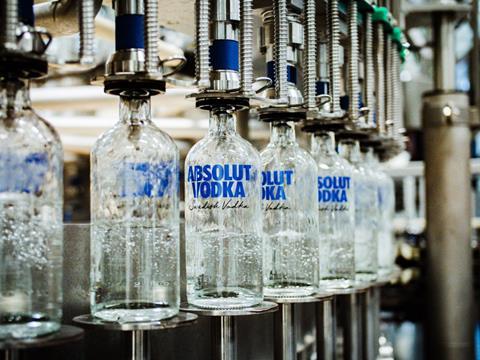
Absolut Vodka has signed an agreement with Ardagh Group to facilitate large-scale production of its vodka bottles at a partly hydrogen energy-fired glass furnace, contributing towards Absolut’s goal of complete CO2 neutrality by 2030.
Located in Limmared, Sweden, the glass production facility belongs to Ardagh Glass Packaging, a subset of Ardagh Group. It is said to power its furnaces with a combination of natural gas and electricity, with Ardagh planning to replace 20% of the former with green hydrogen produced on-site using renewably sourced energy for its pilot with Absolut.
Production of the bottles is expected to commence in the latter half of 2023. It is anticipated to reduce Absolut’s glass-related carbon footprint by 20%, with the company’s distillery already claiming to produce 98% fewer emissions than others of its kind.
Bo Nilsson, managing director of Ardagh Glass Limmared AB, says: “Our industry needs to be less reliant on fossil fuels and transition at pace to using more green energy. By investing in this new technology, we are embarking on a journey to reduce the carbon footprint of our glass packaging.
“There are challenges with such innovation, but we are committed to being an early mover in future-proofing our glass manufacturing operations worldwide.”
Stéphanie Durroux, chief executive of The Absolut Company, adds: “Given we’ve been investing in our own production for decades, decreasing our emissions and increasing energy efficiency, we’re now in a position where we also can focus on the parts of our value chain that are outside of our own scope.
“The glass manufacturing industry is on a transformative journey, and the world can’t wait for the perfect solution. A bold and innovative approach is needed to accelerate radical change that will help solve the significant sustainability challenges that all glassmakers and buyers of glass face.”
Sustainability Awards finalist Berlin Packaging presented Aurelia, a ‘carbon neutral’ wine bottle made using renewable energy sources and offsetting emissions through a dedicated programme.
Last year, AB InBev claimed to have created the world’s lightest longneck beer bottle, with each individual bottle expected to reduce carbon emissions by 17%.
Another collaboration between Birmioli Pharma and Glass Futures is set to open a pilot furnace in a ten-year project seeking to develop glass production processes with low CO2 emissions.














No comments yet